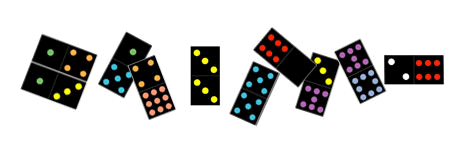Or search by topic
Number and algebra
Geometry and measure
Probability and statistics
Working mathematically
Advanced mathematics
For younger learners
Guess the Dominoes for Two



- Problem
Here's a game to play with an adult!

How do you play?
You'll need an adult to play with.
If you've got a set of dominoes, you can use those. If you haven't you could make a set (in colour or black and white).
You'll also need a set of the rule cards and a piece of coloured paper to use as 'the Box'.
Give the rule cards to the adult and keep the dominoes yourself.
The adult looks at the rule cards and secretly chooses one.
Your job is to find out what it says on that rule card.
Choose one domino and give it to the adult.
Ask “Does this domino fit your rule?”
If the answer is 'yes' put the domino into the Box. If the answer is 'no' put it outside the Box.
Keep giving dominoes to the adult until you think you have worked out what it says on the rule card.
Say “Is your rule ...?”
If you're right, you could swap roles.
If you're wrong keep going!
What's the least number of dominoes you needed to offer?
This game is all about making sensible guesses, or conjectures, and explaining your thinking. It is also about the language and concepts of number - depending on the age of the child this could range from simple number names (one, two, three) to number concepts (odd, even) through to quite advanced ideas (difference, multiple). It isn't a fast game but depends on bringing together lots of pieces of information to make deductions.
Easier version: use a smaller set of dominoes (0-4 dots) and the simple rules which you can find here. Have all the rule cards on view and turn them over once they have been eliminated.
Harder version: use all the dominoes (you could even make a 0-9 set) and keep the rule cards hidden from view.
When you've completed a game, talk together about how the rule was found.
Repeat the game, aiming to reduce the number of dominoes offered.
There's a group version of this game here.

